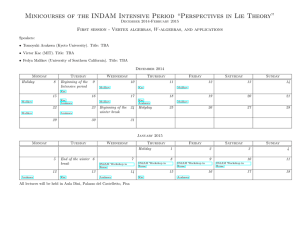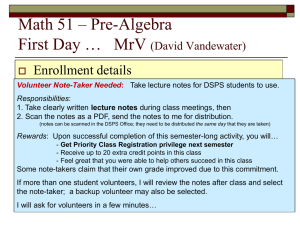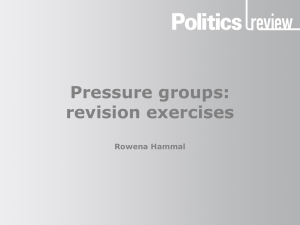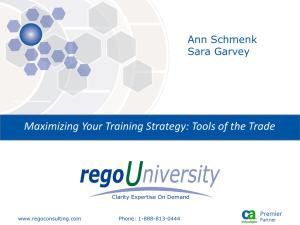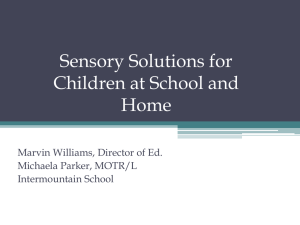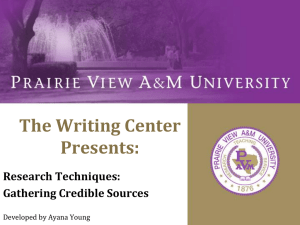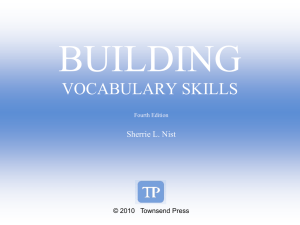Critical Thinking: Chapter 3
advertisement
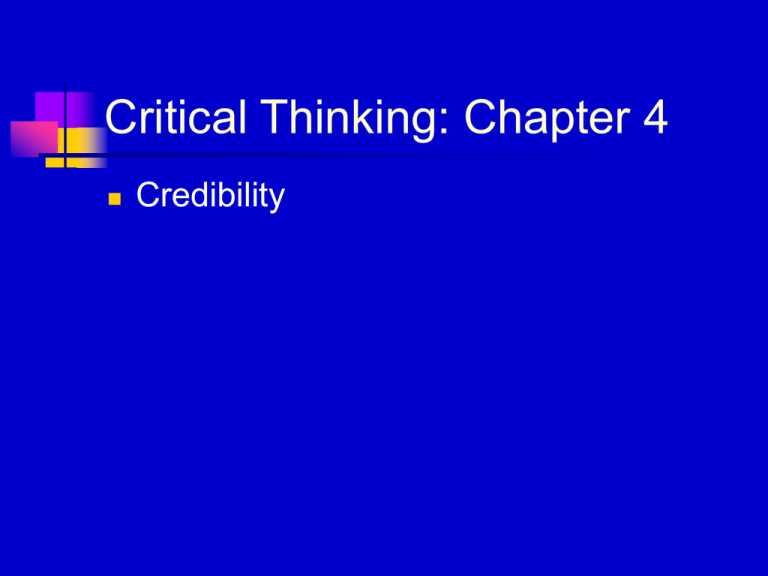
Critical Thinking: Chapter 4 Credibility Credibility Are you gullible? Credibility Are you gullible? Do you get taken advantaged of? Credibility Are you gullible? Do you get taken advantaged of? Do people think you are naïve? Credibility Are you gullible? Do you get taken advantaged of? Do people think you are naïve? Are you trusting? Is there anything wrong with being trusting? Credibility Are you gullible? Do you get taken advantaged of? Do people think you are naïve? Are you trusting? Is there anything wrong with being trusting? Are you a skeptic? Credibility Are you gullible? Do you get taken advantaged of? Do people think you are naïve? Are you trusting? Is there anything wrong with being trusting? Are you a skeptic? These are the type of questions we are going to look at in this chapter. Credibility Is a claim credible or not? Basically credibility comes in degrees. Credibility It is very difficult to judge the credibility of a person just by looking at them. Credibility 1st general principle: “It is reasonable to be suspicious if a claim either lacks credibility inherently or comes from a source that lacks credibility.” So there are two issues here: When does a claim lack credibility and when does a source lack credibility? Credibility 2nd general principle: “A claim lacks inherent credibility to the extent it conflicts with what we have observed or what we think we know (our background information), or with other credible claims. Assessing the Contents of the Claim Does the claim conflict with our personal observations? Four Issues with observations: The problem is that we are aware that observation is a trick business. There are four issues with observations: 1. Observations depend on the conditions under which they are made. Four Issues with observations: 1. Observations depend on the conditions under which they are made. For Example: Perhaps the lighting is poor or the room is noisy; perhaps we are distracted, emotionally upset, or mentally fatigued. Four Issues with observations: 2. The power of observation can differ with people’s expertise and experience. For Example: Some people have special training or experience that makes them better observers. Four Issues with observations: 3. Expectations often influence observation. For Example: We overlook many of the mean and selfish actions of the people we love. By contrast, people we detest can hardly do anything that we don’t perceive as mean and selfish. Four Issues with observations: 4. An observation made in the past suffers from the same dangers of unreliability as memory in general. Critical thinkers are always alert to the possibility that what they remember having observed may not be what they did observe! Does the claim conflict with our background information? Background information includes all the general and specific facts we have learned through our lives. Three points to remember: Does the claim conflict with our background information? Background information includes all the general and specific facts we have learned through our lives. Three points to remember: 1. Together with direct observation, background information forms the ground against which to pose any new claim. Does the claim conflict with our background information? Background information is that immense body of justified beliefs that consists of facts we learn from our own direct observation and facts we learn from others. Background information: Much of our background information is well confirmed by a variety of sources. Factual claims that conflict with this store of information are usually quite properly dismissed. Background information: For Example: We immediately reject the claim “Palm trees grow in abundance near the North Pole,” even though we are not in a position to confirm or disprove the statement by direct observation. Does the claim conflict with our background information? Three points to remember: 1. Together with direct observation, background information forms the ground against which to pose any new claim. Does the claim conflict with our background information? Three points to remember: 2. When two claims conflict, the burden of proof lies on the one with less initial plausibility. We have reason to be more skeptical. Example: A claim that two people swam a mile in cold water, one person is 21 and the other person is 91. Does the claim conflict with our background information? 3. It is important to remember that we don’t have all the background information we need and some of our information may be false. The single most effective means of increasing your ability as a critical thinker, regardless of the subject, is to increase what you know. Assessing the credibility of sources The guiding principle in evaluating claims requires that they come from credible sources. The credibility of people is usually a matter of their knowledge on one hand, and their truthfulness, accuracy, and objectivity on the other. Seven points: Sharpening and Leveling The reports people give one another are very frequently subject to innocent sharpening and leveling--exaggerating what the speaker thinks is the main point and dropping out or deemphasizing details that seem unimportant. The result can be a distortion of the story. Assessing the credibility of sources: 3 points 1. Be wary of eyewitness accounts. Untrained observers are more likely to exaggerate their observations. Example: Several people seeing the same event will often describe it differently! Assessing the credibility of sources: 3 points 2. How we feel about an experience colors our ability to discern objectively. Example: if we really like a band, it may be difficult to give an objective review of their latest album. Assessing the credibility of sources: 3 points 3. Look for expert knowledge. Example: Look for education, training, experience, accomplishments, reputation, and titles. Cautions about experts: Just because someone is an expert in one thing does not make them an expert in all things! The news media and the internet Our abundance of sources of information is a good thing, but it can be complicated when trying to figure out what we can trust and believe. Five points: The news media and the internet: 5 points 1. Most talk shows have a specific political agenda. Look for documentation of sources. The news media and the internet: 5 points 2. The traditional news media has to be watched for both length and depth of coverage. The accessibility of reliable reports also restricts coverage because governments, corporations, and individuals often withhold information. The news media and the internet: 5 points 3. Reporters are, for the most part, given the news. Be careful over having too romantic a view of “the investigative reporter.” Time and money often limit the ability of a reporter to investigate. The news media and the internet: 5 points 4. The media is a business. Follow the money! Good and bad sides to this. Good side: independent of government. Bad side: the need to make a profit. The news media and the internet: 5 points 5. The internet has to be treated like the media: Anyone can put up a web page saying anything, so check for credibility. Sites that represent institutions and universities tend to be more objective and reliable than a site with no backing organization, but it is always a good idea to use your critical thinking skills! Advertising “Advertising is the science of arresting human intelligence long enough to get money from it.” Stephen Leacock Advertising Advertising does not only sell consumer goods. Advertising is used to sell candidates, ideas, and as we have seen recently, wars. Advertising How does advertising work? It acts by creating desires, and it uses every persuasive technique available to excite those desires. Advertising The usual reasons found in an advertisement are vague, ambiguous, misleading, or exaggerated. In doing this we often find ourselves needing something we might not have known existed before! Advertising So what is a good advertisement? Basically a good ad simply lets you know that something you already want is available somewhere at a price you can afford. Exercises Assess each of the following claims as probably true, probably false, as requiring further documentation before judgment, or as a claim that cannot properly be evaluated. Consider both the nature of the claim and the source. “In the early 1800s, bears were a nuisance to settlers in upstate New York.” —Smithsonian Exercises Assess each of the following claims as probably true, probably false, as requiring further documentation before judgment, or as a claim that cannot properly be evaluated. Consider both the nature of the claim and the source. “In the early 1800s, bears were a nuisance to settlers in upstate New York.” —Smithsonian Probably true Exercises Assess each of the following claims as probably true, probably false, as requiring further documentation before judgment, or as a claim that cannot properly be evaluated. Consider both the nature of the claim and the source. NO CHOLESTEROL! —Label on Crisco Corn Oil Exercises Assess each of the following claims as probably true, probably false, as requiring further documentation before judgment, or as a claim that cannot properly be evaluated. Consider both the nature of the claim and the source. NO CHOLESTEROL! —Label on Crisco Corn Oil Probably true. Vegetable oils do not contain cholesterol, and even if you didn’t know that, such claims made by national brands are usually true (despite several famous exceptions). Exercises Assess each of the following claims as probably true, probably false, as requiring further documentation before judgment, or as a claim that cannot properly be evaluated. Consider both the nature of the claim and the source. “Mezzo-soprano Frederica von Stade’s two little girls always tried to keep her from singing in church because, they said, every time she did, everyone would turn around and stare at her.” —Joseph McLellan, in the Washington Post Exercises Assess each of the following claims as probably true, probably false, as requiring further documentation before judgment, or as a claim that cannot properly be evaluated. Consider both the nature of the claim and the source. “Mezzo-soprano Frederica von Stade’s two little girls always tried to keep her from singing in church because, they said, every time she did, everyone would turn around and stare at her.” —Joseph McLellan, in the Washington Post Probably true Exercises Assess each of the following claims as probably true, probably false, as requiring further documentation before judgment, or as a claim that cannot properly be evaluated. Consider both the nature of the claim and the source. “In the near future look for floods in Britain which will culminate in the flooding of Parliament.” —A prediction made by Maitreya Swami, “The World Teacher,” in the News Release of the Tara Center, N. Hollywood, Calif. Exercises Assess each of the following claims as probably true, probably false, as requiring further documentation before judgment, or as a claim that cannot properly be evaluated. Consider both the nature of the claim and the source. “In the near future look for floods in Britain which will culminate in the flooding of Parliament.” —A prediction made by Maitreya Swami, “The World Teacher,” in the News Release of the Tara Center, N. Hollywood, Calif. Probably false. I won’t get into the philosophical difficulties involved in attaching truth values to future contingent events. Exercises Assess each of the following claims as probably true, probably false, as requiring further documentation before judgment, or as a claim that cannot properly be evaluated. Consider both the nature of the claim and the source. “Smoking more than triples the likelihood of premature facial wrinkling.” —Dr. Donald Kadunce, lead author of a group of University of Utah scientists, reporting in Annals of Internal Medicine Exercises Assess each of the following claims as probably true, probably false, as requiring further documentation before judgment, or as a claim that cannot properly be evaluated. Consider both the nature of the claim and the source. “Smoking more than triples the likelihood of premature facial wrinkling.” —Dr. Donald Kadunce, lead author of a group of University of Utah scientists, reporting in Annals of Internal Medicine Probably true, but you’d probably want to have a look at the study to see, among other things, how the degree of wrinkling is ascertained. Exercises Assess each of the following claims as probably true, probably false, as requiring further documentation before judgment, or as a claim that cannot properly be evaluated. Consider both the nature of the claim and the source. University student to professor: “I’m sorry I missed the test on Thursday, Dr. Aarsack. My grandmother unexpectedly died, and I had to go home.” Exercises Assess each of the following claims as probably true, probably false, as requiring further documentation before judgment, or as a claim that cannot properly be evaluated. Consider both the nature of the claim and the source. University student to professor: “I’m sorry I missed the test on Thursday, Dr. Aarsack. My grandmother unexpectedly died, and I had to go home.” Requires further documentation. Exercises Assess each of the following claims as probably true, probably false, as requiring further documentation before judgment, or as a claim that cannot properly be evaluated. Consider both the nature of the claim and the source. “A few years ago AT&T did two surveys showing that technically trained persons did not achieve as many top managerial jobs in the company as liberal arts graduates did.” —New York Times Exercises “A few years ago AT&T did two surveys showing that technically trained persons did not achieve as many top managerial jobs in the company as liberal arts graduates did.” —New York Times Probably true. It is often risky to accept what secondhand reports say about what surveys “show,” but the New York Times is a credible source. This claim is probably true. Note, however, the vagueness of “did not achieve” and “top managerial jobs.” Exercises Q: Did Marilyn Monroe keep a diary about her relationships with John and Robert Kennedy? A: No. —Walter Scott’s Personality Parade, Parade Exercises Q: Did Marilyn Monroe keep a diary about her relationships with John and Robert Kennedy? A: No. —Walter Scott’s Personality Parade, Parade Requires further documentation. Scott’s question-and-answer column is probably a reasonably reliable source of information about the questions asked. Secret diaries are always a possibility, of course. Exercises Comment from an acquaintance: “I saw Bigfoot with my own eyes! It was huge!” Exercises Comment from an acquaintance: “I saw Bigfoot with my own eyes! It was huge!” Probably false; observational error is more likely than incorrect background information. Exercises “Every day 5,000 Americans try cocaine for the first time—a total of 22 million so far— according to estimates by the National Institute on Drug Abuse. About five million people are believed to be using the drug at least once a month, and they are administering it to themselves in increasingly destructive ways.” —James Lieber, in the Atlantic Exercises “Every day 5,000 Americans try cocaine for the first time—a total of 22 million so far—according to estimates by the National Institute on Drug Abuse. About five million people are believed to be using the drug at least once a month, and they are administering it to themselves in increasingly destructive ways.” —James Lieber, in the Atlantic Requires further documentation. I don’t know much about the National Institute on Drug Abuse, but I have found the Atlantic to be pretty reliable in factual matters. Notice that no exact figures are claimed; the first is explicitly said to be an estimate, and the phrases “about” and “believed to be” qualify the second. I would expect these claims to be close to the truth. Exercises Reported after a debate between Al Gore and Bill Bradley, who were running for the Democratic nomination for the presidency in 2000: “Lt. Gov. [of California] Cruz Bustamante, a Gore supporter, declared his candidate the ‘winner’ in the debate, saying he’d made his case more strongly.” Exercises Reported after a debate between Al Gore and Bill Bradley, who were running for the Democratic nomination for the presidency in 2000: “Lt. Gov. [of California] Cruz Bustamante, a Gore supporter, declared his candidate the ‘winner’ in the debate, saying he’d made his case more strongly.” Cannot properly be evaluated. Absolutely unreliable for reasons of bias. We’d reserve judgment. Exercises “Do you feel insecure? Or are you confident about your position in life? According to Dr. Ian Cameron, how and where you stand in an elevator will reveal the answers to these questions.” —Reported in the National Examiner. Dr. Cameron is described in the article as “a noted scientist and researcher.” Exercises “Do you feel insecure? Or are you confident about your position in life? According to Dr. Ian Cameron, how and where you stand in an elevator will reveal the answers to these questions.” —Reported in the National Examiner. Dr. Cameron is described in the article as “a noted scientist and researcher.” Cannot properly be evaluated. Is this remark the conclusion of a study? A speculation on the part of Dr. Cameron? Who is Dr. Cameron, anyway? I am suspicious because so little information is given about him. More important, the claim runs counter to my background information. Exercises “[Atmospheric nuclear] tests do not seriously endanger either present or future generations.” —Edward Teller, physicist, one of the “fathers” of the atomic bomb, 1958 Exercises “[Atmospheric nuclear] tests do not seriously endanger either present or future generations.” —Edward Teller, physicist, one of the “fathers” of the atomic bomb, 1958 Requires further documentation. I’d expect this kind of claim, coming from such a source, to be trustworthy. That it turned out to be false probably shows either that Teller was biased or that there was not enough information on the effects of atmospheric tests in 1958, or both. Exercises Discuss whose opinion on the foreign policy of the current administration is more credible. a. A former U.S. president of the same political party as the current president b. A former U.S. president not of the same political party as the current president For the following, discuss which source you’d trust more, and give at least one reason why. Exercises Discuss whose opinion on the foreign policy of the current administration is more credible. a. A Ph.D. in political science whose speciality is U.S. foreign policy b. The chairman of the U.S. Senate Foreign Relations Committee For the following, discuss which source you’d trust more, and give at least one reason why. Exercises Discuss whose opinion on the condition of the tires on your car is more credible. a. A salesperson at Goodyear b. A mechanic at a garage certified by the American Automobile Association Exercises Issue: A proposal for legislation regarding automobile insurance rates is on the ballot. Discuss whose opinion on the benefits for consumers is more credible. a. A spokesperson for the insurance industry b. Ralph Nader Exercises Did life evolve, or was it created? Discuss whose opinion is the more credible. a. A biologist b. A minister Exercises What percentage of American high school students have smoked marijuana? a. USA Today b. Americans for Legalized Marijuana (ALM) Exercises How many homicides involve the use of a stolen firearm? a. A Democratic U.S. senator b. A Republican U.S. senator Exercises Which of two current movies you would be more apt to like? a. One recommended by a movie critic whose opinions you enjoy listening to b. One recommended by a friend Exercises What is the best weight-lifting regimen to follow? a. Arnold Schwarzenegger b. Roseanne Exercises Discuss the credibility and authority of each individual or group listed with regard to the questions or issues posed. Whom would you trust as most reliable on each subject? You are thinking of insulating your attic and need advice relative to how much insulation you should install. a. b. c. company d. e. A company that sells insulation but does not install it A company that sells and installs insulation An energy consultant from your local gas and electric Consumer Reports A friend who has recently had his attic insulated Exercises a. b. c. company d. e. A company that sells insulation but does not install it A company that sells and installs insulation An energy consultant from your local gas and electric Consumer Reports A friend who has recently had his attic insulated I think you are most likely to get the best information from (d), with (c) a close second; (a) and (b) are about equal in credibility, and (e)’s ranking depends on where he got his information. Exercises You’ve purchased a wood-burning stove. You are uncertain, however, what kind of wood to burn in it. You’ve heard that some produce more smoke, some are more likely to contribute to chimney fires, some burn hotter than others, and so forth. a. The dealer from whom you purchased the stove b. A friend of yours who has used a wood-burning stove for years c. Another friend who sells firewood d. A U.S. Department of Agriculture publication, “Comparative Properties of Fuelwood” e. A professor of environmental horticulture at a state university Exercises You’ve purchased a wood-burning stove. You are uncertain, however, what kind of wood to burn in it. You’ve heard that some produce more smoke, some are more likely to contribute to chimney fires, some burn hotter than others, and so forth. a. The dealer from whom you purchased the stove b. A friend of yours who has used a wood-burning stove for years c. Another friend who sells firewood d. A U.S. Department of Agriculture publication, “Comparative Properties of Fuelwood” e. A professor of environmental horticulture at a state university All these sources are credible, but (d) should rank first, and, most likely, (a) should rank last. Exercises A number of your friends have taken up jogging, and you wonder whether your taking it up might have genuine health benefits for you. a. Your family physician b. A magazine for runners c. A friend who teaches physical education in high school d. The author of a best-selling book on sports medicine e. A friend who is president of a local runners club Exercises a. b. c. d. e. Your family physician A magazine for runners A friend who teaches physical education in high school The author of a best-selling book on sports medicine A friend who is president of a local runners club (b), (c), and (e) might tend to be promoters of jogging, so I’d be mildly skeptical of any pro-jogging claims they might make (but less skeptical of any liabilities of jogging that they might mention). I’d find (a) a more credible source, although many general practitioners may not have the time to keep up on such specialized areas. The best potential source is probably (d), although I’d be cautious unless I knew something about the author; he or she might also tend to exaggerate either the benefits—or the risks—of jogging. Exercises You are looking at a sailboat that you’re considering buying, but you’ve never owned one before and don’t know whether you should buy this one. a. The boat salesman at the marina that owns the boat b. A boat salesman from another marina c. A friend who has owned several similar boats d. A buyer’s guide published by a sailing magazine e. Your own appraisal Exercises For the following, discuss which source you’d trust more, and give at least one reason why. You may want to add to or otherwise modify our lists of sources. And do keep in mind that we are glad our livelihoods do not depend on a general consensus on our rankings. Issue: Should lawyers allow their clients to lie? a. b. c. d. e. The U.S. Supreme Court A law school professor A political science professor The American Bar Association A practicing defense attorney Exercises This question is not so straightforward and simple as it might seem. For instance, has a client who is forced to tell the truth in effect been denied an effective defense? Can one even know that one’s client has lied? In forming my opinion on the subject, I’d be most influenced by the reasoning of the person who seemed to have the best grasp of the various subsidiary issues involved. In other words, in this case it’s the reasoning rather than the credentials of the reasoner that will carry the most weight. (I would not anticipate that any of the sources listed would be deficient in powers of reasoning.) Exercises Issue: In the O. J. Simpson murder case, did the judge rule correctly in admitting evidence that was obtained at Simpson’s house before a search warrant was issued? b. County c. a. A well-known defense attorney who heads the American Trial Lawyers Association The former district attorney for Los Angeles A retired judge on the U.S. Court of Appeals Exercises a.A well-known defense attorney who heads the American Trial Lawyers Association The former district attorney for Los Angeles b. County c. A retired judge on the U.S. Court of Appeals I put (c) way out in front, and the other two equally biased on opposite sides of the issue. Exercises Issue: Does violence on television contribute to violent behavior on the part of young viewers? a. The president of the National Association of Broadcasters b. The president of an organization called “Parents Against TV Violence” c. A university sociologist d. Regular panel members of a program such as “Crossfire” or “The McLaughlin Group” Exercises a. The president of the National Association of Broadcasters b. The president of an organization called “Parents Against TV Violence” c. A university sociologist d. Regular panel members of a program such as “Crossfire” or “The McLaughlin Group” I rank (c) first, followed by (b), who would be ahead of (a). I do know what side (b) is on from the outset, of course, but that’s somewhat different from having a vested interest in one side of the issue in the way that (a) does. I find most of the people like those mentioned in (d) to be full of hot air on most subjects. Exercises Issue: Do mountain bicycles cause ecological damage when ridden on hiking trails? a. An environmental scientist at the Harvard School of Public Health b. The chair of the Sierra Club task force for determining club policy on the wilderness use of mountain bicycles c. A spokesperson for a bicycle manufacturer d. A park ranger from a state park where mountain bicycles have been permitted on hiking trails e. A representative of the Washington Mountain Bike Riders’ Association Exercises a. An environmental scientist at the Harvard School of Public Health b. The chair of the Sierra Club task force for determining club policy on the wilderness use of mountain bicycles c. A spokesperson for a bicycle manufacturer d. A park ranger from a state park where mountain bicycles have been permitted on hiking trails e. A representative of the Washington Mountain Bike Riders’ Association (c) = (a) My ranking: (d) = (b) first, then (e) = Exercises Issue: Are schools of business turning out too many ill-prepared M.B.A. graduates? a. The dean of the school of business at the University of Chicago b. The president of the Hewlett-Packard Corporation c. An editorial in the Wall Street Journal d. A recent graduate with an M.B.A. Exercises Issue: Are schools of business turning out too many ill-prepared M.B.A. graduates? a. The dean of the school of business at the University of Chicago b. The president of the Hewlett-Packard Corporation c. An editorial in the Wall Street Journal d. A recent graduate with an M.B.A. My ranking: (c), (b), (a), (d) Exercises Issue: What levels of mercury and other metals in fish are high enough to make their consumption hazardous to humans? a. An article in a journal called Diet and Health, published for vegetarians b. A commercial fisherman c. A family medical doctor d. A spokeswoman for the National Institutes of Health e. A toxicologist who works for the Los Angeles coroner’s office Exercises a. An article in a journal called Diet and Health, published for vegetarians b. A commercial fisherman c. A family medical doctor d. A spokeswoman for the National Institutes of Health e. A toxicologist who works for the Los Angeles coroner’s office My ranking: (d), then a substantial gap, then (e) and (c), another gap, then (a), (b) Exercises Issue: Were there unjustifiable cost overruns in the construction of ships made for the U.S. Navy by Lytton Industries? a. The chair of the Senate Armed Services Committee b. The accounting director for Lytton c. The Navy Chief of Staff d. The OMB (Office of Management and Budget) e. An article in The Progressive (a left-of-center political journal) Exercises a. The chair of the Senate Armed Services Committee b. The accounting director for Lytton c. The Navy Chief of Staff d. The OMB (Office of Management and Budget) e. An article in The Progressive (a left-of-center political journal) Our ranking: (d), (a), depending on the individual’s politics, then (c) = (e), (b) Exercises State whether the following are true or false. You should assume that the claims made by others are false unless you have some specific reason to believe otherwise. Exercises State whether the following are true or false. You should assume that the claims made by others are false unless you have some specific reason to believe otherwise. False Exercises State whether the following are true or false. If you have reason to believe that an expert is biased, you should reject that expert’s claim as false. Exercises State whether the following are true or false. If you have reason to believe that an expert is biased, you should reject that expert’s claim as false. False (The possibility of bias is occasion to question his or her claims, to suspend judgment on them, to give more weight to alternative claims from unbiased experts, and so on—this is different from rejecting the original expert’s claims as false.) Exercises State whether the following are true or false. Except when we have the means to record our observations immediately, they are no better than our memories happen to be. Exercises State whether the following are true or false. Except when we have the means to record our observations immediately, they are no better than our memories happen to be. True Exercises State whether the following are true or false. Fallible or not, our firsthand observations are still the best source of information we have. Exercises State whether the following are true or false. Fallible or not, our firsthand observations are still the best source of information we have. True Exercises State whether the following are true or false. Reference works such as dictionaries are utterly reliable sources of information—otherwise they wouldn’t be reference works. Exercises State whether the following are true or false. Reference works such as dictionaries are utterly reliable sources of information—otherwise they wouldn’t be reference works. False Exercises State whether the following are true or false. A surprising claim, one that seems to conflict with our background knowledge, requires a more credible source than one that is not surprising in this way. Exercises State whether the following are true or false. A surprising claim, one that seems to conflict with our background knowledge, requires a more credible source than one that is not surprising in this way. True Exercises State whether the following are true or false. Factual claims put forth by experts about subjects outside their fields are not automatically more acceptable than claims put forth by nonexperts. Exercises State whether the following are true or false. Factual claims put forth by experts about subjects outside their fields are not automatically more acceptable than claims put forth by nonexperts. True Exercises State whether the following are true or false. You are rationally justified in accepting the view of the majority of experts in a given subject even if this view turns out later to have been incorrect. Exercises State whether the following are true or false. You are rationally justified in accepting the view of the majority of experts in a given subject even if this view turns out later to have been incorrect. True
